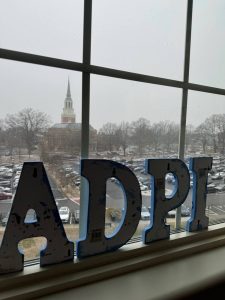Forsyth community suffers in wake of pandemic
Local government must take a more active role in relief delivery to Forsyth County
January 28, 2021
Forsyth County, N.C’s deployment of COVID-9 relief grants, particularly to low-income residents, has proven ineffective in the months since mid-2020. As unemployment rises throughout the county — especially in the accommodation and food services sectors — financial relief is essential in the mitigation of this pandemic crisis.
That low-income and minority communities should be most drastically impacted by the economic downturn and public health crisis — to the extent that over half of low-income families reported experiencing job loss as a result of the pandemic — is expected given existing disparities in access to social services, healthcare, and employment opportunities. The Depression-era burdens facing low-income Americans as a result of the COVID-19 pandemic seem to belie the 2019 Health Security Index’s first place ranking of the United States’ pandemic response capabilities.
Much of the economic carnage resulting from widespread job loss might have been avoided had federal, state and local governments coordinated an effective distribution of pandemic relief. However, a disorganized rollout of relief funding hindered distribution efforts while the pandemic worsened.
Coronavirus Aid, Relief, and Economic Security (CARES) funding was deployed with direct aid dispensed based on a county population threshold rather than on more important indicators. Resultantly, whereas neighboring Guilford County, N.C. received $93.7 million in CARES Act funding, Forsyth County received only a $6.4 million share of the funding allocated to North Carolina.
The size of Forsyth’s CARES grant hamstrung its pandemic response, forcing Winston-Salem, the county seat and fifth-most-populous city in the state, to reallocate unspent economic development money and raise funds from businesses, individuals and local governments to make relief distribution viable. However, the county’s funding channels — particularly, its reliance on local nonprofits to facilitate aid distribution — made the actual deployment of relief funding complicated. Local nonprofits remain overburdened given the unprecedented demand for financial relief and social services. Most nonprofits possess neither the staff or the infrastructure to handle such an influx and in many cases limitations of the usage of CARES funding has prevented organizational growth.
Furthermore, local nonprofits in Forsyth County, such as Crisis Control Ministry and United Way, require extensive means-testing (a process by which an individual proves they are eligible to receive a grant) and an array of paperwork as part of their grant applications. In most cases, residents applying for pandemic relief are required to provide documentation of employment history, records of spending habits and personal finance documents that may be difficult to acquire. The arduousness of the grant application process is a deterrent for those who persist. Such administrative requirements significantly elongate the application process and delay the nonprofit’s response. Many nonprofits also require in-person appointments at their local offices in order to receive aid. Beyond the public health implications of such a requirement, in-person appointments frequently prevent those with jobs or who require childcare, as well as those without access to transportation, from acquiring necessary funding.
A considerable lack of transparency exercised by the nonprofits responsible for distributing aid has left questions about the funding remaining at the county’s disposal. Housing advocates in Winston-Salem note that very few low-income residents are actually receiving relief grants and that well-qualified applicants are being denied funding. Simultaneously, many city and county governments were unable to allocate the entirety of their CARES funding prior to the end-of-year spending deadline due to similar distribution roadblocks, forcing Congress to extend the deadline through the end of 2021. These delays in aid distribution highlight both the detrimental impact of federal distribution of CARES funding and means-testing on access to relief funds.
The county’s — and the country’s — failure to adequately provide for those most vulnerable to the pandemic recession will disrupt the lives of countless residents and reverberate for decades to come. City and county governments must take a more active role in administering relief funding locally. Means-testing and other burdensome application requirements must be eliminated in order that funding becomes available to those who need it.











